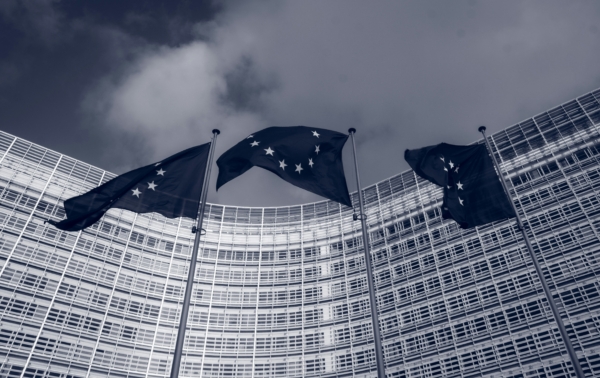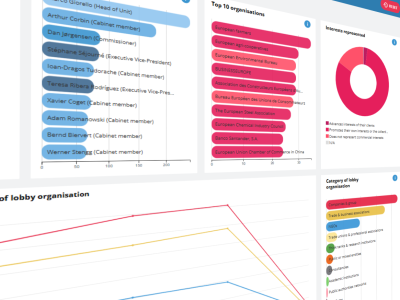The newly elected European Parliament could have been a clean slate. After all, it was wracked by probably the largest corruption scandal it had ever seen in 2022, and it marginally tightened its internal ethics rules as a result. But it left perhaps the most glaring issue of parliamentary ethics—the prevention and management of conflicts of interest—largely unaddressed. In fact, conflicts of interest relating to side jobs are, strictly speaking, permitted, as long as MEPs are transparent about them.
MEPs therefore had the chance to start anew. They had the chance to signal they took their newly gained electoral mandates seriously by refusing to engage in jobs on the side. We analysed their declarations of private interests to find out whether MEPs had taken this opportunity. These declarations are featured on our updated Integrity Watch EU database.
Our key findings
Instead, we found that MEPs have declared more side activities this time around than they had at the end of the previous mandate. In fact, 74% of MEPs—or three in four—have some sort of side activity, as our latest research into the new European Parliament can reveal. Close to a third of MEPs have declared at least one income-generating activity, collectively estimated at an annual income of 6.3 million euros. As a reminder, MEPs earn around 100,000 euros per year as their salaries. They face no limitations on side income amounts, as long as they are transparent about them.
They do however face one theoretical limitation on the types of side jobs they can perform, as they cannot “engage in paid lobbying activities directly linked to the EU decision-making process”. This is a rather fuzzy constraint: the types of activities that might fall under this stipulation aren’t officially listed anywhere. In fact, our analysis found that 159 activities are with entities registered on the EU’s own transparency register. That’s 159 side activities with organisations that are actively involved in lobbying to change EU rules. While the exact nature of the activity must be considered, a registered activity always warrants further scrutiny.
Let’s have a look at some examples of the nearly 1,700 declared activities:
- One MEP is a member of the Committee for Environment, while earning another 5,000 euros annually as a member of the sustainability advisory board of one of the largest electricity companies in Europe, which is registered on the EU’s transparency register.
- An MEP is a member of both the Committee for Environment and the Committee on Agriculture, while earning 51,240 euros annually as the president of the Bavarian Farmers’ Association.
- One MEP is on the Supervisory Board of BayWa AG, making a striking 75,000 euros per year. This international company is active in multiple areas including but not limited to agriculture, construction, and energy.
- Another MEP is a freelance consultant in the automotive industry earning an estimated 120,000 euros per year, while being a sitting member of the three Committees responsible for Environment, Industry and Internal Market.
We also found more obscure descriptions of activities submitted by MEPs, such as “self-employed person” or “member of the supervisory board” (without indicating which entity this might pertain to). While activity descriptions have improved since our last analysis, with only 8% of activities below our best practice threshold, we still found 23 MEPs with income-generating activities without providing the corresponding income amount.
Explanations for this range from “it is not possible to specify this at this stage” to “Income from consultancy to be determined at the end of the current year based on the activities carried out”. The purpose of the declarations is to facilitate public scrutiny of these side jobs. Knowing the type of activity, organisation name, ownership structure and actual incomes are key for the prevention of conflicts of interest.
Analysis by political group and EU member state
We found large discrepancies in terms of side activities by political groups in the European Parliament. The top 10 largest earners almost exclusively come from political groups on the right of the political spectrum.
And if you look at average income per political group, the European Conservatives and Reformists (ECR) come out on top, at an estimated 55,000 euros per year from MEPs declaring income. This is significantly higher than the average income of 29,000 euros for all MEPs with income.
In terms of average income per country, MEPs with paid activities from Romania, Cyprus and Luxembourg come out on top. Romania is an outlier here, though. It is worth noting that Romanian MEPs face additional scrutiny of their side activities through interest declarations at the national level, submitted to the electoral commission prior to elections. Similarly, French MEPs must submit declarations to the High-Authority for Transparency in Public life, an independent body that can pro-actively investigate declarations. Most MEPs, however, do not face national scrutiny. This further reinforces the need the urgent need for an effective system at EU level.
Gender analysis
We’ve further considered the gender balance within these declarations. Currently, the European Parliament’s gender distribution stands at 61% to 39% in favour of men. The absolute numbers of paid activities nearly reflect this divide (67% to 33%). But when we look at the amounts MEPs are paid, the data changes quite drastically: male MEPs make 81% (5.2m euros) of all earned side income. Women earn 19% (1.1m euros) of the pot.
A new start?
So, the new European Parliament contains the same old problems. The system of declarations is self-governed, with no pro-active verification performed to check the accuracy of information provided and effectively manage potential conflicts of interest. As the Parliament itself admits, MEPS “are personally responsible for the content of their declarations. There is no mandate to investigate or check the content and there is no legal basis to ask for proof or supporting documents”. It is unclear why the Parliament would not be able to perform these minimal checks.
At the start of a new mandate, MEPs have inherited an inadequate ethics system, borne of a failed reform process of the Parliament’s internal rules. It is rampant with loopholes: side jobs and conflicts of interest remain allowed. MEPs are still not declaring the full details needed for proper scrutiny. Parliamentary services claim they do not have the mandate to request supplemental documentation to verify the contents. Where breaches are discovered, MEPs are rarely sanctioned. And even in the case of sanctions, these are weak and insufficient to serve as an effective deterrent. Breaches to the code are investigated by an advisory committee composed of MEPs themselves. The application of the Code of Conduct relies entirely on the goodwill of the President of the Parliament.
MEPs must seize the opportunity of a new mandate to finally instil a culture of integrity, with adequate and enforceable rules. The Parliament can ill-afford another Qatargate-type corruption scandal. Citizens deserve better. They must be assured that decisions taken on their behalf are free from undue influence and conflicts of interest.
Our key recommendations:
- The European Parliament should ban MEPs from engaging in side activities, paid or unpaid, with organisations that are seeking to influence EU policymaking.
- Parliament should check declarations diligently with a prior screening system, to investigate the completeness, accuracy and sincerity of information contained. Imprecise, inaccurate, and incomplete declarations should be categorically rejected. Parliament should introduce more robust sanctions in cases of non-compliance.
- The declarations forms should limit free text and require MEPs to report clients (where applicable), the economic sector concerned and the name of entities as they are registered on national business registers.
- The scope of the Data Portal should be expanded to include all information related to MEPs, including votes, roles, declaration of private interests, lobby meetings and declaration of attendance at third party sponsored events, published in machine-readable formats.
- In case of a perceived conflict of interest, MEPs should take necessary measures to resolve the conflict of interest and not be allowed to hold any office of power related to that conflict, including being a rapporteur or shadow rapporteur on a file, without the necessity of a vote by the respective committee. The mere perception of a conflict of interest should suffice to prevent them from holding such roles until the conflict of interest is resolved.
Consult our methodology here.








